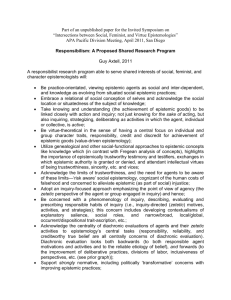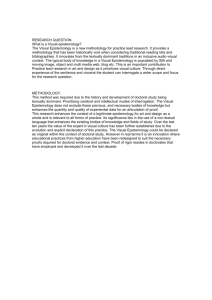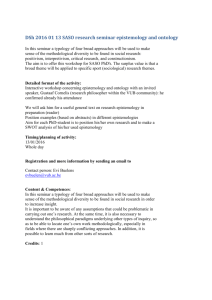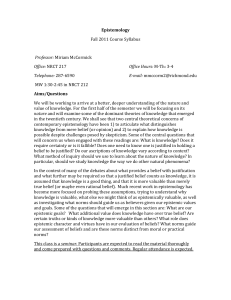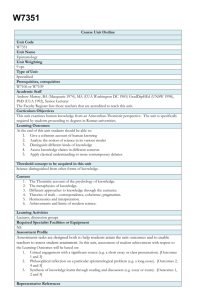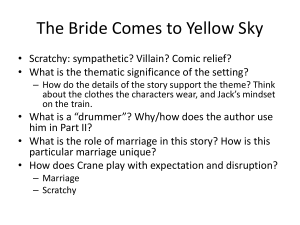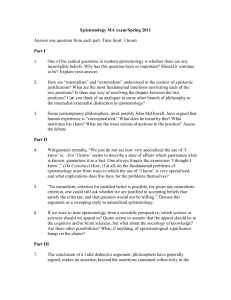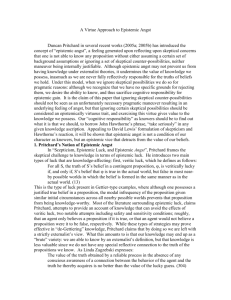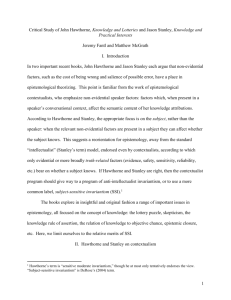Thesis Proposal - The Role of Chance in Epistemology
advertisement
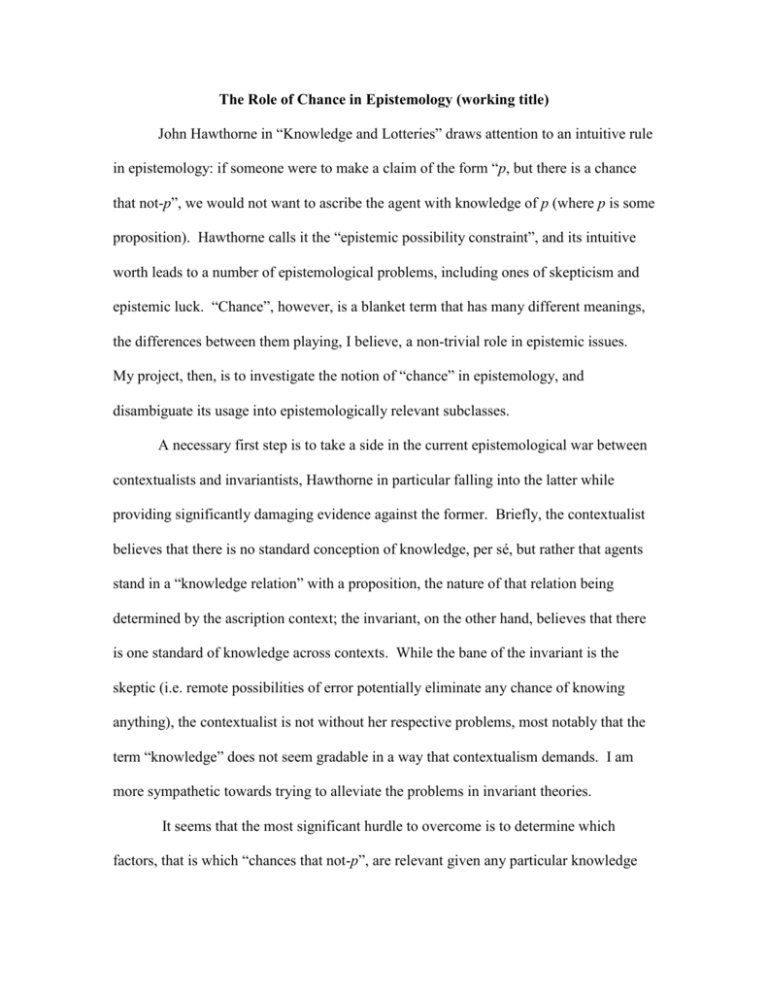
The Role of Chance in Epistemology (working title) John Hawthorne in “Knowledge and Lotteries” draws attention to an intuitive rule in epistemology: if someone were to make a claim of the form “p, but there is a chance that not-p”, we would not want to ascribe the agent with knowledge of p (where p is some proposition). Hawthorne calls it the “epistemic possibility constraint”, and its intuitive worth leads to a number of epistemological problems, including ones of skepticism and epistemic luck. “Chance”, however, is a blanket term that has many different meanings, the differences between them playing, I believe, a non-trivial role in epistemic issues. My project, then, is to investigate the notion of “chance” in epistemology, and disambiguate its usage into epistemologically relevant subclasses. A necessary first step is to take a side in the current epistemological war between contextualists and invariantists, Hawthorne in particular falling into the latter while providing significantly damaging evidence against the former. Briefly, the contextualist believes that there is no standard conception of knowledge, per sé, but rather that agents stand in a “knowledge relation” with a proposition, the nature of that relation being determined by the ascription context; the invariant, on the other hand, believes that there is one standard of knowledge across contexts. While the bane of the invariant is the skeptic (i.e. remote possibilities of error potentially eliminate any chance of knowing anything), the contextualist is not without her respective problems, most notably that the term “knowledge” does not seem gradable in a way that contextualism demands. I am more sympathetic towards trying to alleviate the problems in invariant theories. It seems that the most significant hurdle to overcome is to determine which factors, that is which “chances that not-p”, are relevant given any particular knowledge claim or attribution. Hawthorne himself, a “moderate” invariantist, thinks that not every potentially knowledge destroying possibility need be “taken seriously” simply in virtue of its mention, but does not elucidate reasons why. Relevance and the related notion of salience are contentious, and yet still largely unexplored, areas of epistemology in contemporary literature: for example, John Greco claims salient factors are those which are “unusual”, while Jason Stanley says that non-epistemological “stakes” determine which factors need to be attended to (and thus further determine which factors are salient in a given knowledge ascription), but neither of these theories sit well. I think contemporary epistemology has essentially attempted to tackle the problem of salience from the wrong end: instead of asking what is important, I think it is more fruitful to ask what can be ignored and, more importantly, why. Hawthorne does give a brief potential solution for what needs to be “taken seriously”, something he defines as an “epistemic possibility for the agent.” This fails for at least two reasons: first, although he wants to draw a distinction between “attention” and “salience” (i.e. something need not be taken seriously just because one is attending to it) it is unclear how by attending to something it does not become an epistemic possibility for the agent, and second, it seems that Hawthorne is saying that the less we attend to the more we potentially know (or can be ascribed as knowing), essentially an “ignorance is epistemic bliss” position that feels very unintuitive. The source of the problem is found in Bayesian epistemology, which grants the ability to assign a statistical probability to any possibility. In invariant epistemology this is counterproductive: if every possibility becomes a probability, then “chance that not-p” becomes an extremely large class, a damaging process for two main reasons. First, that any skeptical concern may count as a “chance that not-p”, and thus prevent us from making any knowledge claims or ascriptions, and second, the fact that for any given knowledge ascription there are a potentially limitless number of skeptical concerns that could be raised results in many small probabilities of error quickly adding up to a probability that forces us to change our beliefs according to Bayesian formulae. The potential solution is to ignore small probabilities, but then when considering the lottery problem (that, despite tremendous odds, intuitively we are unable to know that we will lose a lottery) this practice does not seem viable. Hawthorne’s salience criteria allow us to keep Bayesian epistemology (as not all possibilities would be the concern of any given epistemic agent) but then we are forced to accept the counter-intuitive results outlined above. The other solution is to reject the Bayesian epistemological practice of assigning probabilities to any possibility; this is the path I wish to take (the statistical formulae and epistemic calculus can still be used, however). Thus my project essentially becomes the process of disentangling the heretofore conflated concepts of “possibility” and “probability” in epistemology, which have existed in the literature under the single term “chance.” With a restricted Bayesianism we can say that non-ignorable “chances that not-p” are those factors that can be properly assigned a probability of occurring. The burden then becomes, of course, to define what is meant by “proper assignment”. I feel that this is captured by the notion of expectation, in both the statistical sense, and that of “common usage”. The first is a standard mathematical probability calculation, representing, for example, the chances of winning a lottery or of drawing a specific card from a well-shuffled deck. The latter, “common usage” notion of expectation represents factors that we would expect to occur, but more importantly implies that we should ignore skeptical concerns that are in no ways expected to occur. As I reject Bayesian principles, the statistical expectation will not result in assigning concrete probabilities to simply any skeptical concern, but will, nevertheless, make small statistical probability salient (capturing lottery problem intuitions), while “common usage” expectation means that far-fetched skepticism can safely be ignored. Multiple invariant epistemologists have also put forward the theory that practical, essentially non-epistemic concerns determine whether an agent has knowledge in a given situation. The most prominent “practical concern” is that of stakes, the consequence being that we are more likely to attribute knowledge to an agent if not much of a practical concern rests on her knowing the particular claim, whereas we would be hesitant to ascribe knowledge to a different agent where said knowledge has great practical consequences. I fear that again such a prescription leads to counterintuitive conclusions, most notably that in a situation with two agents having the same cognitive capacities and the same evidence, one may be ascribed knowledge if the stake are lower for her than for her high-stakes counterpart. Additionally, the “less we are concerned with, the more we know” problem arises, where intuitively we would be wont to ascribe more knowledge to more epistemically shrewd agents. Practical concerns, I propose, help agents to acquire further pieces of knowledge and true beliefs, but do not themselves dictate which beliefs count as knowledge. A second way that “chance” is a factor in epistemology is in questions of epistemic luck, and the definition of chance in terms of expectation can then be, I believe, applied to the debate surrounding the proper treatment of “luck” in epistemology. The problem is essentially that if one holds a belief that is true simply “by chance”, then that belief should not count as knowledge. Many different conceptions of luck have been put forth in the contemporary literature: Duncan Pritchard’s notion that luck is essentially a modal concept, Wayne Riggs’ addendum of a “lack of control” condition, and Nicholas Rescher’s notion that luck is an exclusively probabilistic entity. While each new definition attempts to more acutely define the notion of luck by either presenting a new theory entirely or amalgamating a number of previous theories, what actually results is a literature of muddled ideas, that I believe take us further away from how epistemic luck should be characterized. “Luck”, as I tentatively see it, is that which is unexpected in the colloquial sense, with a little or no statistical expectation. A number of examples should show what I mean by this: an individual’s winning the lottery has a low statistical expectation (since the chances of winning are very low, and the player only buys one ticket, say) and a low colloquial expectation (we generally don’t expect someone to win the lottery if they’ve bought one ticket). A high statistical expectation and a high colloquial expectation should not be considered a matter of luck (for example hitting the side of a barn with a baseball). The upshot of the project is to create a form of moderate invariantism that avoids the pitfalls and counterintuitive conclusions of theories such as Hawthorne’s. Making apparent the difference between possibility and probability can, I believe, show that we are still able to retain a great amount of knowledge of ordinary propositions without having to subscribe to contextualism. Bibliography DeRose, Keith. “Solving the Skeptical Problem.” Philosophical Review. 104(1): 1-52. ---. “Contextualism and Knowledge Attributions.” Philosophy and Phenomenological Research. 52(4): 913-929. Greco, John. “Knowledge as Credit for True Belief,” in Intellectual Virtue: Perspectives from Ethics and Epistemology, Michael DePaul and Linda Zagzebski, eds. Oxford: Oxford University Press, 2004. Hawthorne, John. Knowledge and Lotteries. Oxford: Clarendon Press, 2004. Howson, Colin and Peter Urbach. Scientific Reasoning: The Bayesian Approach. Illinois: Open Court, 1989. Jeffrey, R.C. The Logic of Decision. New York: McGraw-Hill Book Company, 1965. Lewis, David. “Elusive Knowledge.” Australasian Journal of Philosophy. 74: 549-567. Pritchard, Duncan. Epistemic Luck. Oxford: Clarendon Press, 2005. Rescher, Nicholas. Luck. New York: Farrar Straus Giroux, 1995. Riggs, Wayne D. “Reliability and the Value of Knowledge.” Philosophy and Phenomenological Research. 64(2002): 1-24. ---. “What are the ‘Chances’ of Being Justified?” Monist. 81.3(1998): 452-473. ---. “Why Epistemologists are so Down on Their Luck.” Synthese. Forthcoming. Sosa, Ernest. “Skepticism and Contextualism.” Philosophical Issues. 10(2000): 1-18. Stanley, Jason. Knowledge and Practical Interests. Oxford: Clarendon Press, 2005. Williamson, Timothy. Knowledge and its Limits. Oxford: Oxford University Press, 2000.


